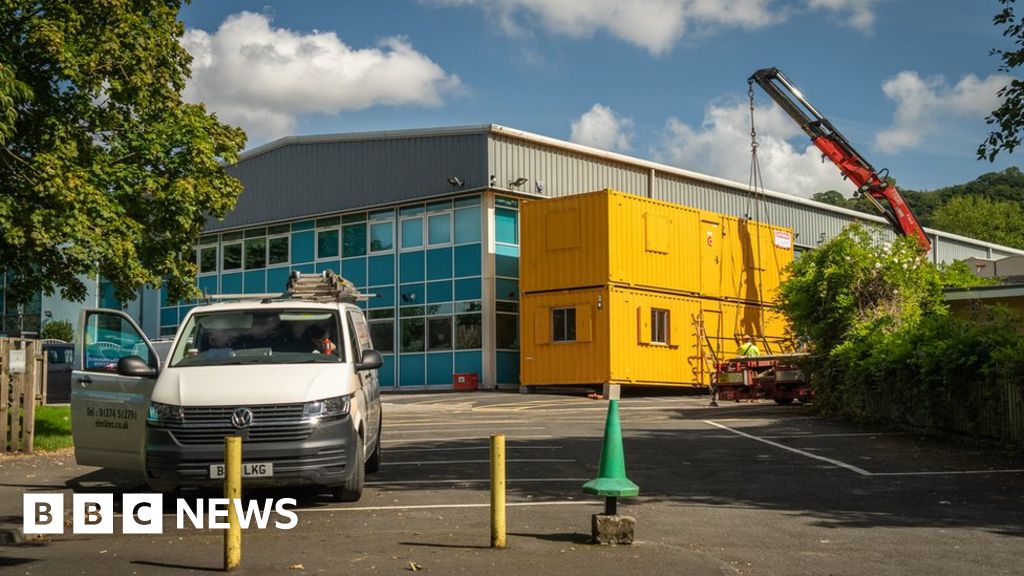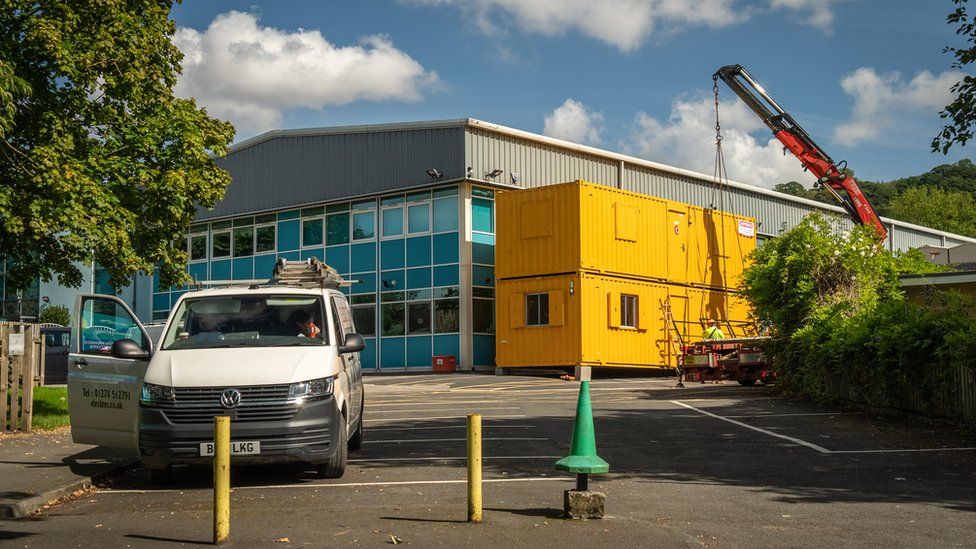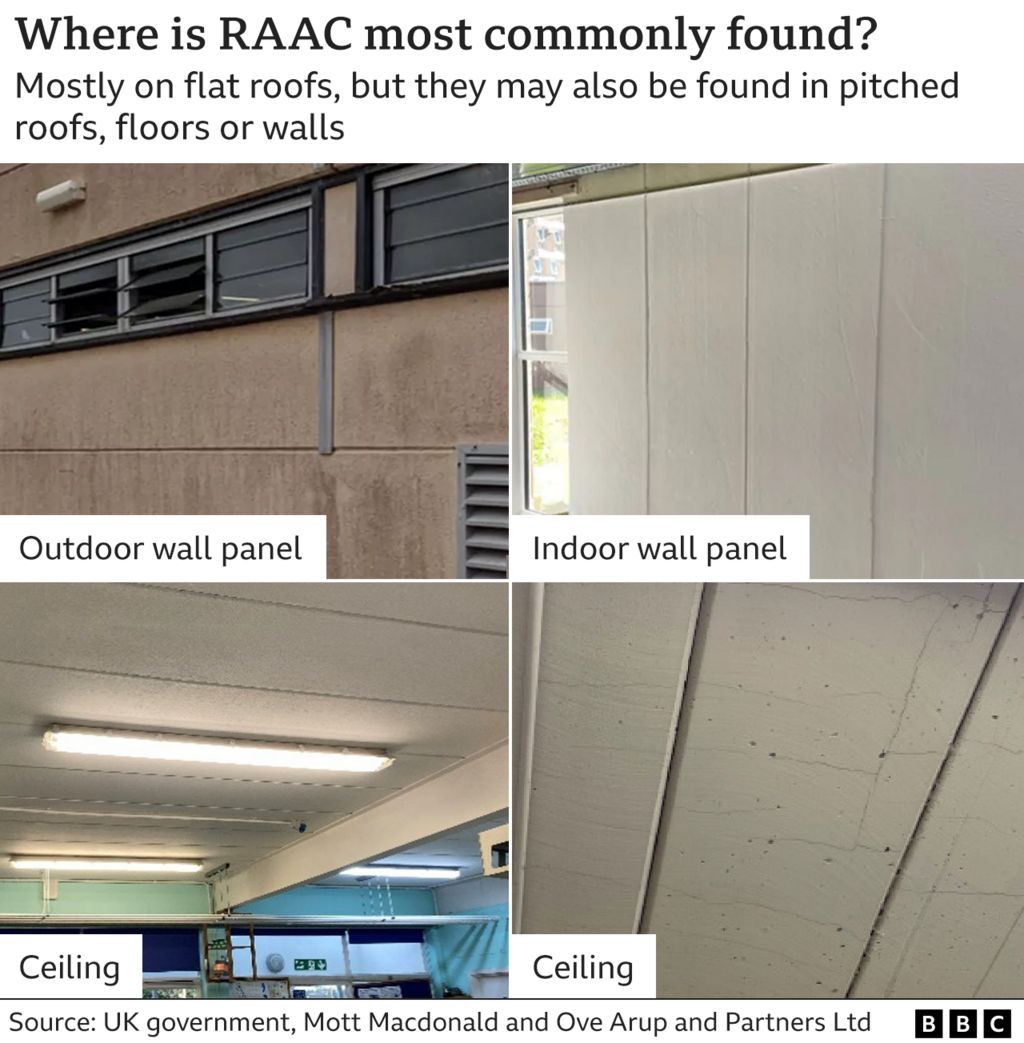
Schools with dangerous concrete race to replan start of term
More than 100 English schools have to make new arrangements days before term begins.
www.bbc.com
Schools with dangerous concrete race to replan start of term

By Hazel Shearing & Sam Hancock
BBC News
More than 100 schools in England are scrambling to make arrangements after being told to shut buildings with a type of concrete prone to collapse.
The government gave the order just days before the start of the autumn term.
Some pupils have already been told they will be learning remotely, in temporary classrooms or at different schools.
The government has not said when a list of affected schools will be published, drawing criticism from the Labour Party.
Shadow education secretary Bridget Phillipson, who said Labour had not seen the full list, urged ministers to "come clean with parents and set out the full scale of the challenge that we're facing".
On Thursday, Education Secretary Gillian Keegan said affected schools would contact parents directly, adding: "If you don't hear, don't worry".
Schools found with buildings containing reinforced autoclaved aerated concrete (RAAC) have been told they must introduce safety measures, which could include propping up ceilings.
A "minority" will need to "either fully or partially relocate" to alternative accommodation while those measures are installed, the Department for Education (DfE) has said.
But the DfE has not given a timeline for replacing the material, which was used until the mid-90s.
Ms Keegan said the government was taking a "cautious approach", and that "over the summer a couple of cases have given us cause for concern".
At Willowbrook Mead Primary in Leicester, where arrangements have been made for children from different year groups to attend two different schools, while older pupils will have to use online learning, the head teacher said in a letter to parents: "I appreciate that the timing is far from ideal."
It is one of many schools affected after the DfE announced on Thursday that any space or area in schools, colleges or nurseries, with confirmed RAAC should no longer be open without "mitigations" being put in place.
This came after the government was made aware of a number of incidents where RAAC failed without warning, not just in school buildings, but elsewhere too.
Ms Keegan said her department's plan would "minimise the impact on pupil learning and provide schools with the right funding and support they need to put mitigations in place to deal with RAAC".
But teachers' unions have criticised the DfE for making the call so close to pupils returning to school.
"It is absolutely disgraceful, and a sign of gross government incompetence, that a few days before the start of term, 104 schools are finding out that some or all of their buildings are unsafe and cannot be used," National Education Union general secretary Daniel Kebede said.
Media caption,
Watch: Education secretary tells parents not to worry and shares more details about how schools were identified
The risk of injury or death from a school building collapse was said to be "very likely and critical" by the watchdog the National Audit Office (NAO) in June, after it highlighted concerns for school buildings that still contained RAAC.
This is a lightweight "bubbly" form of concrete used widely between the 1950s and mid-1990s - usually in the form of panels on flat roofs, as well as occasionally in pitched roofs, floors and walls. It has a lifespan of around 30 years.
While the vast majority of schools and colleges will be unaffected by this announcement, the NAO report identified 572 schools where this concrete might be present.
There are 156 settings in England with confirmed RAAC, according to DfE data. Of those, 52 already had safety mitigations in place, and 104 were being contacted this week about getting them in place.
The DfE said it sent a questionnaire to schools in 2022, asking if they had any confirmed or suspected cases of RAAC in their buildings. If schools provided a positive response, this was then confirmed by DfE-commissioned engineers.
Schools that are concerned but have not yet filled out the survey are encouraged to do so at this website, the DfE said.
The Education Hub, a blog run by the DfE, said based on responses, schools with suspected RAAC would be brought forward for surveying. It said it hopes all schools suspected to contain RAAC will be surveyed within weeks.
Two primary schools in Bradford - Crossflatts and Eldwick - are among those affected, with parts closed to pupils after the concrete was identified, the council said.
Shazad Ismail's son, Yahya, is about to go into Year 5 at Crossflatts. Part of one building has been closed and temporary classrooms are now being built.

Image caption,
Nine-year-old Yahya is a pupil at an affected school
"We're devastated," Mr Ismail told the BBC.
"The head teacher sent a letter... it's going to widely affect a lot of children."
Other schools that BBC News has gathered evidence on, which suggests they are also affected, are:
- Ferryhill School, a secondary in County Durham - an email to parents, seen by the BBC, said the start of the new school year would be delayed. New starters would start a week late with the rest being taught online, it said. One parent told the BBC his year seven daughter was apprehensive about starting school and this put them in a "difficult position"
- Willowbrook Mead Primary Academy, Leicester - parents were told in a letter from the school, seen by the BBC, about complex arrangements to send children from different year groups to two different schools, and give older children home schooling
- Corpus Christi Catholic Primary School, Brixton, south London - a statement from 18 August says juniors are to be relocated to a neighbouring school
The Local Government Association said it had been warning about the risk of RAAC since 2018.
"Leaving this announcement until near the end of the summer holidays, rather than at the beginning, has left schools and councils with very little time to make urgent rearrangements and minimise disruption to classroom learning," said Cllr Kevin Bentley, its senior vice-chairman.
Julie McCulloch, director of policy at the Association of School and College Leaders, which represents mostly head teachers, said the government had "failed to invest sufficiently in the school estate" and called the announcement a "scramble".
She said it was "clearly vital", but "the actions these schools will need to take will be hugely disruptive, and this will obviously be worrying for pupils, families and staff".
"The government should have put in place a programme to identify and remediate this risk at a much earlier stage," she added.
Liberal Democrat education spokeswoman Munira Wilson said "pupil safety is paramount but for this to come out just days before term starts is totally unacceptable".
The government says it has been aware of RAAC in public sector buildings, including schools, since 1994.
It said it has advised schools to have "adequate contingencies" in place since 2018, in case affected buildings needed to be evacuated.
The Welsh government has said it will survey the country's schools and colleges to check if any are made with RAAC.
Numerous public buildings have been identified as being at risk because of RAAC, including schools, hospitals and police stations.

